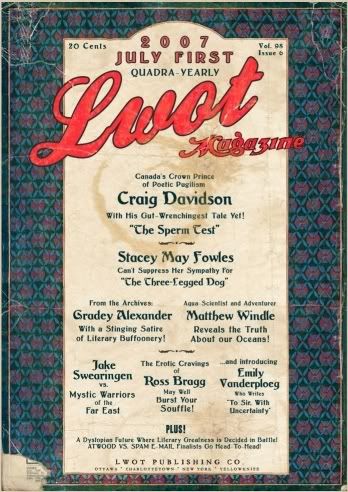Many of you have probably read this morning's editorial in the Times Book Review by Stephen King. It's pretty much a ripoff of his own introduction to the new Best American Short Stories, and is about his favorite topic: how Ivy League intellectual snobs have ruined literature.
You'd think that, in the wake of his complete acceptance by the "literary establishment" that he for so long was convinced disdained him, King would no longer feel it necessary to write pretentious little screeds like this; but if you think that, you don't know King. This is the most outrageously class-obsessed writer in the world, the guy who trots out his working class cred at every available opportunity, and there was no way something like winning the actual admiration of powerful people would put a stop to it.
The essay in question is structured as an imaginary big-box store visit, where King discovers that the literary magazines are expensive, and you have to bend over to read them. He uses these observations to assert that the audience for serious fiction has dwindled. And then he says that this audience
happens to consist of other writers and would-be writers who are reading the various literary magazines (and the New Yorker, of course...) not to be entertained but to get an idea of what sells there. And this kind of reading isn't real reading, the kind where you just can't wait to find out what happens next... It's more like copping-a-feel reading. There's something yucky about it.
Got that? If you're a young writer, and you're reading that New Yorker story, and think you find it entertaining, sorry, you're mistaken. Actually, you're a pervert. And a calculating snob/loser/poseur. And if you claim that you are able to enjoy a story that operates by means other than event-driven narrative linearity, you are lying.
What a bunch of fucking bullshit. King is certainly right about the limited audience for literary fiction. He's right that most fiction sucks, too. But most fiction has always sucked. You can't name the shitty writers of 1923, not because they didn't exist, but because they didn't last. Bad fiction is usually bad in ways that reveal the vanities of its era, and I won't argue that the vanities of this era don't indeed include intellectual pretension, MFA-fueled obfuscatory mediocrity, and emotional detachment.
But dude: get over it. King seems to need, very badly, to believe that everyone in the world is a fake but him. One story in the new B.A.S.S. anthology so perfectly encapsulates the King paranoia that he might have written it himself. In it, a good ol' honest-to-god salt-of-the-earth auto parts salesman tells the story of his brother, a famous "intellectual" writer who mistreats women, humiliates his family, looks down on everyone, and dies miserable. It's a piece of such breathtaking reverse snobbery, classist wish fulfillment, and emotional fakery that I could barely believe my eyes. Like King's essay today, it brims, embarrassingly, with bitterness and jealousy.
I've read pretty much everything King has written, and like a lot of literary writers of my generation, I count him as an influence, in spite of his flaws. But wow, there is no pleasing the guy. The best-selling, wealthiest, most prolific, most loved writer of his generation, enjoyed by readers from all socioeconomic strata and education levels, and he still thinks the phonies are out to get him.
Well, fuck you, man. We literary whipper-snappers are not reading magazines to advance our careers, we're reading them because we like them. Just like you pretend to. You begged and begged to be admitted into the elite, highly selective, and completely imaginary company of the literati, and finally they gave in. And as soon as you strolled through the nonexistent door into their illusory super special secret smart people's club you told 'em they were heartless lame-o's. "I certainly don't want some fraidy-cat's writing school imitation of Faulkner, or some stream-of-consciousness about what Bob Dylan once called 'the true meaning of a pear'."
Guess what, Steve--neither do the rest of us. And enough quoting of Dylan and Springsteen, as part of your endless effort to prove once and for all how very down to earth and populist you are. If there's a hell for snobs, you will reside there for eternity, reading over and over the collected works of Barthes, Derrida, and Baudrillard.
And I'm still going to read your next book.


